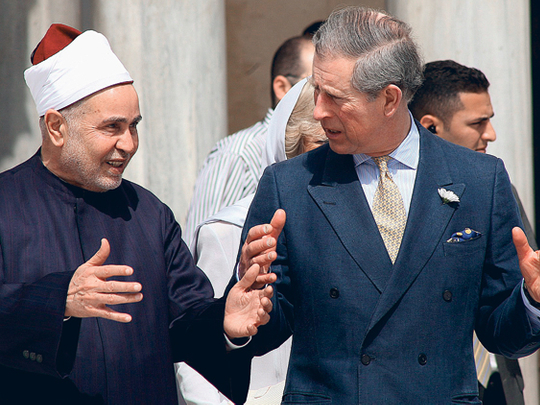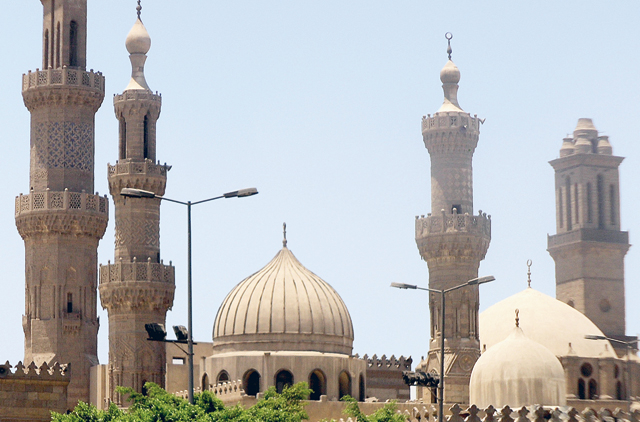
In 1970, following the death of Jamal Abdul Nasser, Egyptian president Anwar Sadat attempted to win more Islamic credentials by announcing that "the Arab world cannot function without Egypt and its Azhar". On its part, the ancient Muslim institution of higher learning has used these powers to delicately place itself between the government and the Islamist opposition.
Since its establishment by the Fatimids to disseminate Shiism from Egypt to the entire Islamic neighbourhood, the 1,000-year-old Al Azhar has played both implicitly and explicitly important roles in the religious, cultural and political arena in Egypt and the wider Arab world.
Shaikh Ebrahim Al Fayoumi, secretary-general of the Academy for Islamic Research, told Weekend Review that Al Azhar has remained the stronghold of Islam in Egypt as it fulfilled its mission of carrying the banner of science and knowledge, and preserving Islamic heritage.
"Today, Al Azhar University has expanded into several modern campuses with thousands of students [studying] Islamic theology every year. The Al Azhar clergy are exported throughout the Muslim world and the US to deliver the message of Islam and issue edicts (fatwas) on disputes submitted to them regarding proper conduct for Muslims," Al Fayoumi said.
Although many critics claim Al Azhar is falling short of its religious and educational goals, Amr Shobky, an analyst with the Al Ahram Centre for Political and Strategic Studies, said: "There are two roles of Al Azhar we need to understand before we criticise it. First, there is the religious role that we know. Second is its relationship with the state, and this is where the crisis exists."
"I actually prefer that Al Azhar doesn't have a political role in society because they're scholars, not political activists and Al Azhar is not a political party," said Shobky. "However, I think that they need to work on their educational role and religious role to be able to come out with credible, well-studied and scientific (fatwas) regarding the different issues that concern people."
Until the last century, almost all of Egypt's educational, legal and social welfare issues were in the hands of religious functionaries, mainly Al Azhar, which made extensive efforts to bring the oldest seat of learning under closer state control by developing a burly civil bureaucracy that would absorb many of its scholars.
Dr Jamal Zakaria, professor of contemporary history at Ain Shams University, believes Al Azhar's role transformed when Egypt's self-declared khedive Mohammad Ali in the 1820s selected Al Azhar students to be sent to France for education under Western systems. Upon their return, they helped create an educational system based on a model that was parallel to, and thus bypassed, the system of Al Azhar. "This contact resulted in founding modern Egypt through the famous science and knowledge renaissance known as the Nahda, which also sought to limit the influence of the Al Azhar shaikhs by allocating positions within the government to those educated outside Al Azhar," he said.
Jamal added that the dramatic shift in Al Azhar came after the Egyptian Revolution of 1952. "Al Azhar became increasingly co-opted into the state, constantly submitted to the carrot-and-stick policies. Even scholars, ulema, were "further weakened by the creation of government agencies such as the Ministry of Religious Endowments, cutting off the mosque's ability to control its financial affairs".
During his tenure as Egypt's president, Nasser continued the efforts to use Al Azhar's influence to his advantage. Al Azhar supported him in his attempts to justify the legitimacy of the war with Israel in 1967, declaring the conflict against Israel as a "holy struggle".
Now the mosque in old Fatimid Cairo is reserved only for prayer as it no longer serves as a college. It was officially designated a university by a 1961 law — which separated the dual roles of the educational institution and the religiousinstitution.
Abdullah Hussaini, vice-president of Al Azhar University, said: "In 1961, Al Azhar was reorganised under the government of Egypt's second president Jamal Abdul Nasser and secular faculties, such as medicine, engineering and agriculture, were added. An Islamic women's faculty was also added the same year. The reforms in the curriculum have led to a massive growth in the number of Egyptian students attending the Al Azhar-run school system."
Since the overthrow of the Shiite Fatimids by the Sultan Saladin Sunni Ayyubid dynasty, the prestigious centre occupied a special place in Egypt's heart as well, being a symbol of resistance against Western imperialism. Nationalist marches, as a revolt against French troops, were launched from Al Azhar, which led French emperor Napoleon Bonaparte to state in his memoirs that "Al Azhar matches Sorbonne University in Paris''.
Other protests also erupted from the womb of the oldest university in the world — ranging from the 1919 revolt against British rule to the famed 1956 speech by president Nasser from Al Azhar's pulpit to rally Egyptians against the tripartite aggression by Britain, France and Israel.
In recent years, several controversial and even contradicting statements by Al Azhar clerics were slammed by media and internal opposition but officials claim much of the criticism is based on false representation and misunderstandings, insisting that students from all over the world still continue to flock to the university for its intense and well-respected curriculum in Islamic studies.
Most of the criticism was pointed at Mohammad Sayed Tantawi, the late Grand Imam of Cairo's Al Azhar mosque and the Grand Shaikh of Al Azhar University. He died earlier this month at the age of 81 during his visit to Saudi Arabia and was succeeded by Ahmad Mahmoud Al Tayeb.
When he was appointed in 1996, Tantawi was viewed as having relatively liberal views on issues such as women's rights. This led to a smear campaign last year following his instruction to a schoolgirl to remove her niqab. He had then said he would seek an official ban on the niqab in Al Azhar schools, which prompted people to accuse him of acting inappropriately as a respectable religious figure. On the other hand liberals applauded Tantawi for standing up against what many saw as a manifestation of ultra-conservative interoperations of Islam.
Some of his stances were appreciated by the West, especially the American administration. When Tantawi strongly condemned the 9/11 terror attacks, United States Secretary of State Hillary Clinton said Tantawi had been "an important voice for dialogue among religions and communities."
"Americans will always remember Imam Tantawi for his condemnations of violence after the terrorist attacks of September 11, 2001, when he said, ‘It's not courage in any way to kill an innocent person'," she had said.
Even though Tantawi is believed to have left a mixed legacy behind him, many believe that he was too liberal for conservatives, too conservative for liberals, too compliant with the regime for those who want Al Azhar to be independent, and too independent for those in the regime who needed more support to enact policy changes on issues as varied as Palestine, banking and TV game shows.
Speaking about his expectations from Tantawi's successor, Shaikh Mahmoud Mugahed, former Al Azhar scholar, said: "The government usually chooses a moderate shaikh. All we can ask is that ... [he] be a shaikh who will work for the best interest of the people and will be biased not towards the government but towards truth."
Historically, the literate theologians of Al Azhar University have promoted the Sunni moderate schools of thought that Egypt has long been famous for, rejecting the version of Islam practised by illiterate religious preachers in the countryside. But the Islamic political activism which started soon after the First World War adopted a more extremist philosophy, which regarded foreign to Egyptian moderation, that came with the underpinning of the Muslim Brotherhood, founded in 1928 by Hassan Al Banna.
The Muslim Brotherhood acquired a reputation as a radical group prepared to use violence to achieve its religious goals. It was implicated in several assassinations, including the murder of a prime minister.
Some believe successive governments used Al Azhar, which receives funds mainly from the Egyptian government, in its conflict against the Muslim Brotherhood.
The clashes between the Egyptian government and the group escalated after the 2006 march at Al Azhar University by masked students who were Muslim Brotherhood members. The movement was accused of operating a "militia", endangering state security and damaging Egypt's image. Following this event, Egyptian authorities cracked down on the group's members inside and outside the Al Azhar fence.
Dr Ali Al Samman, vice-president of the Inter Faith network, said many prominent personalities were students of Al Azhar — Mohammad Abdo, founder of Islamic Modernism, Shaikh Ahmad Yassin, co-founder of Hamas, Sa'ad Zaghloul, leader of the 1919 revolution in Egypt and Taha Hussain, the influential Egyptian writer.
"In addition to being the default religious authority within Egypt, Al Azhar has been looked up to [by countries] other than Egypt for religious judgments. Prior to the Gulf War, Saudi Arabia's King Fahd asked for a fatwa authorising the stationing of foreign troops within the kingdom," he said.
Prominent centre of Islamic theology and education
Al Azhar was founded in AD972 by Jawhar, the Sicilian commander of the troops sent by the Fatimid caliph Almuiz to conquer Egypt.
Named after the daughter of Prophet Mohammad (PBUH), Fatima Al Zahra, Al Azhar was built to be the first university in the world, but this is disputed by the Kairaouine Mosque in Fes, Morocco, specialised in teaching Islamic law and jurisprudence, Arabic grammar.
As Mohammad Ali — who took over as the ruler of Egypt in 1805 — started to build a modern state in Egypt, he relied on the resources of Al Azhar, selecting members of scientific missions sent to Europe from Al Azhar staff.
Prominent political and intellectual leaders of Egypt in the late 19th and early 20th centuries emerged from the ranks of Al Azhar, including Mohammad Abdo, Al Manfalouti and Sa'ad Zaghloul.
Following the 1952 revolution, several steps for modernisation were introduced in Al Azhar as an educational institution, intended to boost its status and role in the service of Islam, knowledge and humanity at large.
According to the law regulating Al Azhar and its related institutes issued on May 5, 1961, the prestigious University of Al Azhar was created under the umbrella of Al Azhar.
The university now includes faculties devoted to Islamic law, jurisprudence, Arabic, medicine, engineering and commerce in addition to separate faculties for girls.
Al Azhar's mission includes the propagation of Islamic religion and culture. To this end, its scholars (ulemas) render edicts (fatwas) on disputes submitted to them from all over the Sunni Islamic world regarding proper conduct for Muslim individuals or societies. Al Azhar also trains preachers in proselytisation (da'wa) appointed by the Egyptian government. Given its history, Al Azhar remains a deeply influential institution in the Egyptian society and a symbol of Islamic Egypt.
Raghda El Halawany is a journalist based in Cairo, Egypt.













